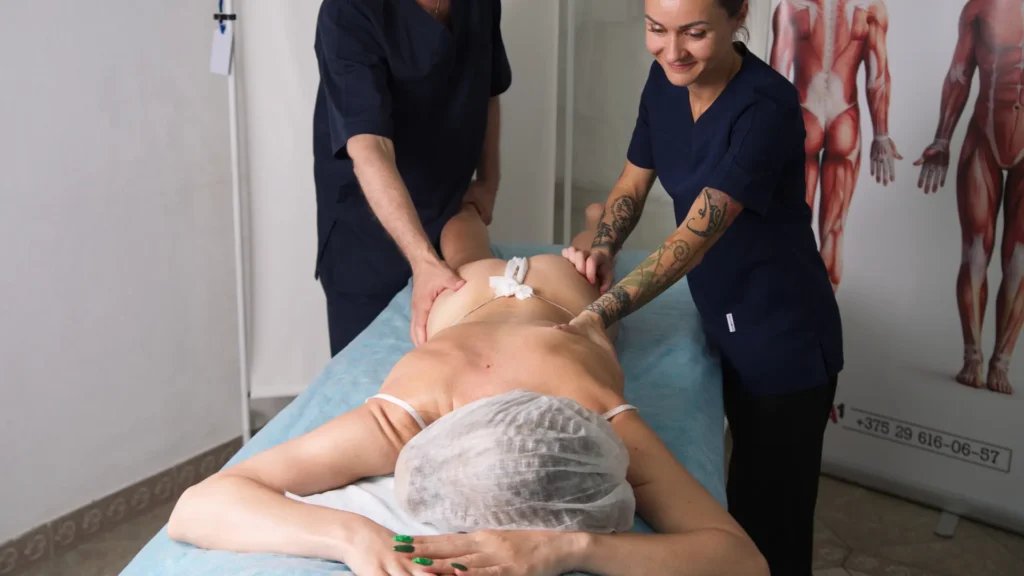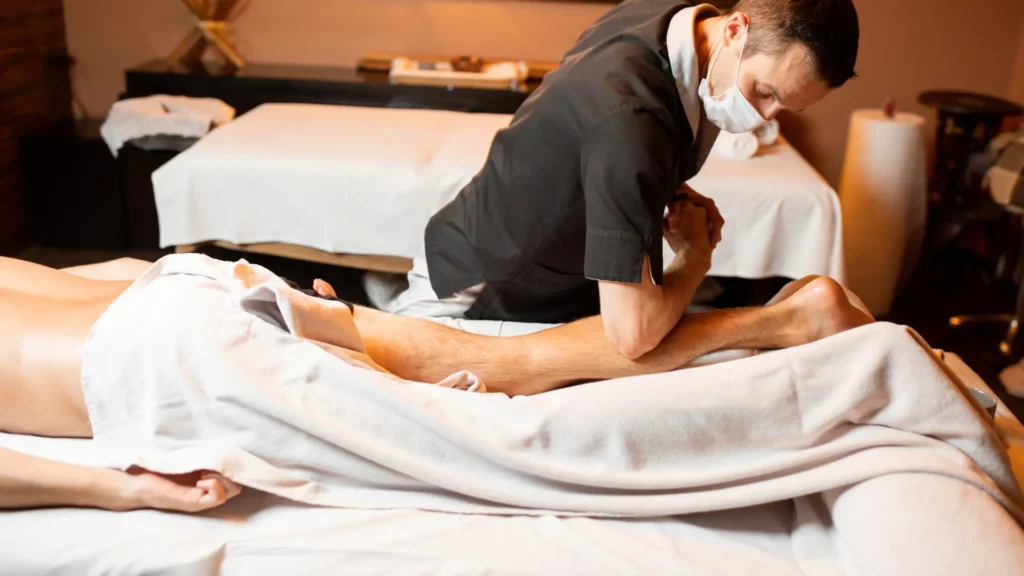In this comprehensive blog post on ‘Can a Deep Tissue Massage Make You Sick? A Therapist’s Guide,’ you’ll discover:
- Common sensations you might experience during and after a deep tissue massage.
- The potential reasons behind feeling sick after this type of massage.
- What to do to Minimize the Risk of Feeling Sick
Ready to explore why some people feel unwell after a deep tissue massage? Let’s get into the details and get tips and insights to help you maximize your massage therapy experience.
Let’s get started!
Quick Answer To: Do you feel Sick after a deep tissue massage
No, As Feeling sick after a deep tissue massage is uncommon. but, it happens due to factors like the release of toxins, dehydration, or overexertion. These sensations are usually temporary and part of the body’s natural healing process. To minimize the risk, prioritize staying hydrated, communicate with your therapist about pressure, and engage in post-massage self-care.
Jump To:
Common Sensations During and After Deep Tissue Massages
Sensations During Deep Tissue Massage
During a deep tissue massage, it’s entirely normal to experience a range of sensations. These sensations may include:
- Pressure: Deep tissue massage involves the application of firm pressure to target specific areas. You may feel a deep, intense pressure as the therapist works on knots and adhesions.
- Discomfort: As mentioned earlier, deep tissue massage can be uncomfortable, primarily when the therapist addresses areas with tension or adhesions. This discomfort is typically manageable and is often described as a therapeutic sensation.
- Release: Many clients also feel relieved during the massage as the therapist works on releasing tension in their muscles and connective tissues.
Sensations After a Deep Tissue Massage
After a deep tissue massage, it’s common to experience some after-effects. These may include:
- Soreness: You might feel soreness in the treated areas, similar to after a strenuous workout. This soreness is a sign that your muscles are adjusting and healing.
- Temporary Discomfort: Some clients may briefly experience mild discomfort or fatigue after the massage, but this usually subsides within a day or two.
Understanding that these sensations are part of the natural healing process during and after a deep tissue massage is essential. While they may seem uncomfortable, they often indicate positive changes within your body.

Potential Reasons for Feeling Sick After a Deep Tissue Massage
Why do you feel sick after a deep tissue massage?
Feeling sick after a deep tissue massage is a concern that some individuals have, and it’s essential to understand the potential reasons behind this phenomenon.
There are a few factors that can contribute to this feeling:
1. Release of Toxins
One common explanation is related to the release of toxins from your muscles and tissues. During a deep tissue massage, the therapist breaks up adhesions and knots in your muscles.
This process can stimulate the release of metabolic waste products, such as lactic acid and other toxins, trapped in these areas. These toxins are transported into your bloodstream and eventually into your lymphatic system.
2. Dehydration
Dehydration can also play a role in feeling sick after a deep tissue massage. This type of massage involves a significant amount of pressure and manipulation of muscle tissue. As a result, it can cause you to sweat and lose fluids, potentially leading to dehydration if you haven’t adequately hydrated before and after the massage.
3. Overexertion
Deep tissue massage involves more intense pressure and focused work on specific areas than other massage techniques. If your therapist applies excessive pressure or if the session is too long, it can lead to overexertion. This, in turn, can make you feel unwell or sick following the massage.
It’s important to note that while feeling sick after a deep tissue massage can happen, it’s relatively uncommon. The discomfort is usually temporary and related to the body’s natural healing processes. However, choosing the best therapist in your area for the deep tissue sessions is always recommended.

Steps to Minimize the Risk of Feeling Sick After a Deep Tissue Massage
Prioritize Hydration
One of the most effective ways to prevent post-massage discomfort, including feelings of sickness, is to stay well-hydrated. Adequate hydration helps your body flush out toxins, reduces the risk of dehydration, and supports muscle recovery. Here’s what you can do:
- Pre-Massage Hydration: Drink plenty of water in the hours leading up to your massage appointment. Starting well-hydrated sets a solid foundation for your session.
- During the Massage: Don’t hesitate to ask your therapist for water if you feel thirsty. They can provide you with a glass to help you stay hydrated.
- Post-Massage Hydration: After your massage, drink water to replenish any fluids lost during the treatment. This ongoing hydration will aid in your body’s recovery process.
Communicate with Your Therapist
Effective communication with your massage therapist is key to a positive and comfortable experience. Don’t hesitate to:
- Discuss Pressure Preferences: Let your therapist know if the pressure during the massage becomes too intense or uncomfortable. They can adjust their technique to suit your needs.
- Share Any Concerns: If you have specific concerns about feeling sick or unwell after the massage, express them to your therapist before the session. They can provide guidance and tailor the treatment accordingly.

Rest and Gentle Activity
After your deep tissue massage, giving your body the time it needs to rest and recover is essential.
Consider the following:
- Rest: Allow yourself some downtime after the massage. Avoid strenuous physical activity immediately following the session to prevent overexertion.
- Gentle Movement: Engage in gentle stretching or light activities to maintain flexibility and alleviate any post-massage soreness. Avoid any vigorous exercise on the same day as your massage.
Follow Post-Massage Self-Care
Implementing self-care practices after your massage can further enhance your comfort and well-being:
- Heat or Ice: If you experience soreness, consider using heat or ice packs as directed by your therapist to soothe discomfort.
- Healthy Meals: Consume nourishing meals to give your body the essential nutrients for recovery.
- Additional Hydration: Drink water throughout the day to support your body’s natural healing processes.
You can significantly reduce the risk of feeling sick after a deep tissue massage by prioritizing hydration, maintaining open communication with your therapist, and following post-massage self-care guidelines. Remember that each individual’s experience may vary, so adapting these recommendations to your needs and preferences is essential.

Final Words for: Can a Deep Tissue Massage Make You Sick?
To summarize and recap, feeling sick after a deep tissue massage is not uncommon, and there are several reasons why it can occur.
These reasons include:
- The potential release of toxins from muscle tissues during the massage.
- Dehydration which can result from the intensity of the massage session.
- There is a risk of overexertion when the therapist applies excessive pressure, or the session is too long.
It’s important to note that while these factors can contribute to post-massage discomfort, the sensations are often temporary and indicative of the body’s natural healing processes.
Understanding the potential sensations and precautions associated with deep tissue massages is crucial. It allows you to approach your massage sessions with awareness and confidence, knowing what to expect and how to mitigate any discomfort.
FAQs About Can a Deep Tissue Massage Make You Sick?
What are the side effects of a deep tissue massage?
Deep tissue massage may have some side effects, varying from person to person. Common side effects include temporary soreness, mild bruising, or discomfort in the treated areas. Some individuals may experience fatigue, headache, or nausea, but these side effects are generally mild and short-lived. It’s essential to communicate with your massage therapist about any discomfort you experience during or after the massage, as they can adjust their techniques to make your experience more comfortable.
Can a deep tissue massage make you have a fever?
A deep tissue massage itself should not cause a fever. However, suppose you experience flu-like symptoms such as fever, chills, or a significant increase in body temperature after a deep tissue massage. In that case, it is likely unrelated to the massage itself. It’s essential to consult a healthcare professional to rule out any underlying medical conditions that may be causing these symptoms.
Can massage cause an upset stomach?
Massage generally should not cause an upset stomach. However, some individuals may be more sensitive to the pressure and manipulation of massage techniques, which could potentially lead to feelings of nausea or an upset stomach. This sensitivity is relatively rare and often associated with intense or deep-pressure massages. If you experience stomach discomfort during a massage, be sure to communicate with your therapist so they can adjust their techniques or provide support to make you more comfortable.






